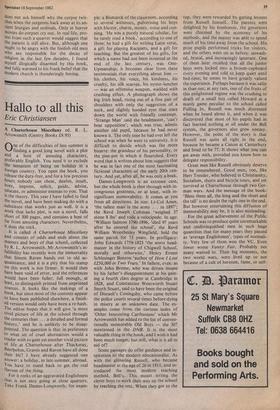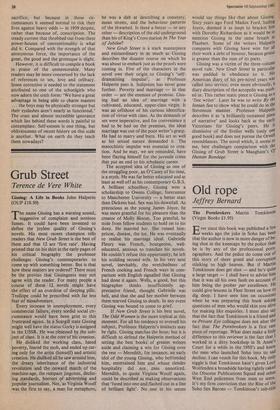Hallo to all this
Eric Christiansen
A Charterhouse Miscellany ed. R. L. Arrowsmith (Gentry Books £9.95)
One of the difficulties of late summer is finding a good long novel with a plot and a host of amusing characters, Preferably English. You need it to exclude the sensation of being on holiday in a foreign country. You open the book, you release the duty-free, and for a few precious hours nobody can cheat, deafen, insult, bore, impress, solicit, guide, advise, educate, or administer enemas to you. That is the theory. This year I have failed to find the novel, and have been making do with a substitute that works just as well. It is a work that lacks plot, is not a novel, falls short of 300 pages, and contains a host of far from amusing characters. Nevertheless, it does the trick.
It is called A Charterhouse Miscellany and consists of odds and ends about the masters and boys of that school, collected by R. L. Arrowsmith. Mr Arrowsmith's in- fallibility has recently won the immortality that Simon Raven hands out to old ac- quaintance, and it is a pity that his stamp on this work is not firmer. It would then have been void of error, and the references would have been fuller; full enough, at least, to distinguish printed from unprinted sources. It looks like the makings of a book, but since most of the contents appear to have been published elsewhere, a finish- ed version would only have been a re-hash. The editor hopes that it will give 'a more vivid picture of life at the school through the centuries than ... a detailed and formal history,' and he is unlikely to be disap- Pointed. The question is this: in preference to what set of cruel alternatives would a reader wish to gain yet another vivid picture of life at Charterhouse after Thackeray, Beerbohm, Graves and Raven have all done their bit? I have already suggested one answer: a holiday, in late.summer, abroad. You have to stand back to get the real flavour of the thing.
For it reeks of an aggravated Englishness that is not easy going at close quarters. Take Frank Dames-Longworth, for exam-
ple: a Bismarck of the classroom, according to several witnesses, pulverising his boys with bluster, charm, money, noise and cun- ning. 'He was a purely natural scholar, for he rarely read a book,' according to one of them; he had a gift for writing Latin verse, a gift for playing Racquets, and a gift for teaching. But the greatest of his gifts, for which a name had not been invented at the end of the last century, was One- Upmanship; it becomes clear from these testimonials that everything about him his clothes, his voice, his kindness, his cruelty, his silk scarves, his oyster-lunches — was an offensive weapon, wielded with crushing effect. A photograph shows the big Irish head, rising out of a fine pair of shoulders with only the suggestion of a neck, and slightly hooded eyes that stare down the world with friendly contempt. `Strange Man' said the headmaster, 'can't bear opposition'; which was true, admits another old pupil, because he had never known it. The only time he had ever left the school was when he went to university. It is difficult to decide which was the more bizarre: the grandeur of his personality, or the pint-pot in which it flourished. Every word that is written about him suggests that he was in fact one of the most fascinating fictional characters of the early 20th cen- tury. And yet, after all, he was only a beak.
Dames-Longworth is an extreme case, but the whole book is shot through with in- congruous greatness, or at least, with in- significant memorability. It comes at you from all directions. In size: Lt-Col Ames, 'the tallest man in the army ... in 1897'; the Revd Joseph Coltman 'weighed 37 stone 8 Ibs' and rode a velocipede. In age: 'William Salmon 1790-1896, 'died 97 years after he entered the school', the Revd William Wriothesley Wingfield, held the same parish for 73 years. In profligacy: John Edwards 1759-1823 'the worst head- master in the history of Chigwell School, morally and otherwise,' Henry Ernest Schlesinger Benzon 'author of Now I Lost £250,000 in Two Years.' In failure, even: as with John Brome, who was driven insane by his father's disappointment at his gain- ing a fourth class degree at Cambridge in 1828, and Constantine Wentworth Stuart Smyth Stuart, said to have been the original of Disraeli's Coningsby, who came before the police courts several times before dying in misery at an unknown date. The ex- amples come from the curious index of 'Other Interesting Carthusians' which Mr Arrowsmith has added to the list of conven- tionally memorable Old Boys — the 307 mentioned in the DNB. It is the most valuable thing in the book, and I wish it had been much longer; but still, what is it all in aid of?
Some passages do offer guidance and in- spiration to the modern educationalist. As with the glittering Russell, who became headmaster at the age of 26 in 1811, and in- troduced the most modern teaching method, Bell's. This meant setting the clever boys to work their way up the school by teaching the rest. When they got to the top, they were rewarded by getting lessons from Russell himself.. The parents were delighted by his bonhomie, the governors were charmed by the economy of his methods, and the master was able to spend much of his time away from the school. His prize pupils performed tricks for visitors, and the others went on as before: unwash- ed, brutal, and increasingly ignorant. One of them later recalled that all the junior boys were locked into a broom-cupboard every evening and told to keep quiet until bed-time; he seems to have greatly valued the experience. Perhaps because it was safer in than out; at any rate, one of the fruits of this enlightened regime was the crushing to death of a small boy called Howard at a manly game peculiar to the school called Pulling In. Russell was much distressed when he heard about it, and when it was discovered that most of his pupils had in fact learned nothing at all under the Bell system, the governors also grew uneasy. However, the point of the story is that Russell was quite all right in the end, because he became a Canon at Canterbury and lived to be 77. It shows what you can get away with, provided you know how to delegate responsibility.
Great men like Russell obviously deserve to be remembered. Good men, too, like Herr Tressler, who believed in Christianity, Socialism, shorts and bicycle tours, and yet survived at Charterhouse through two Ger- man wars. And the message of the book: 'Bless them all, the long and the short and the tall' is no doubt the right one in the end. But however entertaining this diffusion of memorability may be, it is also misleading.
For the great achievement of the Public Schools was to produce quite unremarkable and undistinguished men in such huge quantities that for many years they passed as 'average Englishmen', types of normali- ty. Very few of them won the VC. Even fewer wrote Vanity Fair. Probably not many wanted to. Their big moments, the two world wars, were lived up to not because of a cult of heroism, fame, or self- sacrifice, but because in those cir- cumstances it seemed normal to risk their lives against heavy odds — in 1939 despite, rather than because of, conscription. The steady current that throbbed out from these power-houses of conventionality is what did it. Compared with the strength of that anonymous force, the importance of the great, the good and the grotesque is slight.
However, it is difficult to compile a book in praise of the unmemorable. Many readers may be more concerned by the lack of references to sex, love and celibacy. Some corrective is needed to the statement attributed to one of the schoolgirls who now adorn the sixth form: 'We have a great advantage in being able to charm masters ... the boys may be physically stronger but their eyelashes aren't nearly as functional.' The crass and almost incredible ignorance which lies behind these words is painful to contemplate. Self-esteem is one thing, but obliviousness of recent history on this scale is another. What on earth do they teach them nowadays?



































 Previous page
Previous page